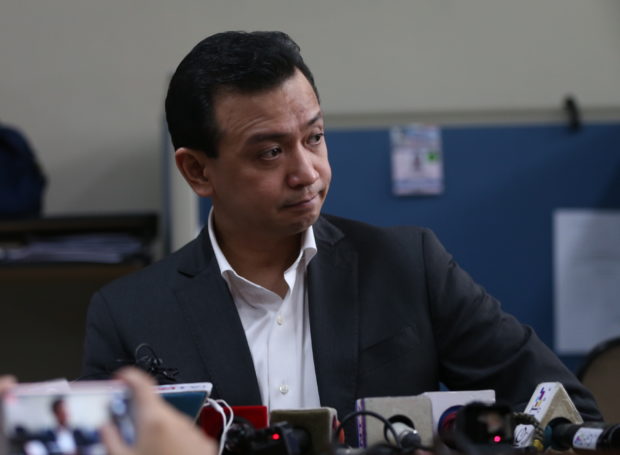Malacañang on Tuesday challenged opposition Sen. Antonio Trillanes IV to file an impeachment complaint against President Duterte after it suspended Overall Deputy Ombudsman Melchor Arthur Carandang.
The Palace on Monday suspended Carandang for 90 days for grave misconduct and other administrative offenses after he disclosed the alleged bank records of the President .
Presidential spokesperson Harry Roque also dismissed the senator’s allegation that the administration was “bullying” the Office of the Ombudsman, which was investigating the plunder charge that Trillanes had filed against the President.
“Go ahead and file the impeachment complaint. Do it ASAP and we will see you in the House (of Representatives),” Roque said.
Trillanes, who released the bank records of Mr. Duterte during the 2016 presidential campaign, said Malacañang’s move against Carandang was an “impeachable offense.”
He said the suspension violated Section 5 of Article XI of the 1987 Constitution, which, he pointed out, “clearly states the independence of the Office of the Ombudsman and its Deputies.”
Trillanes also noted that the Supreme Court affirmed in 2014 that Malacañang had no power to discipline the Office of the Deputy Ombudsman.
“Clearly, this is another Duterte tactic that’s meant to bully democratic institutions into submission so he could go on with his dictatorial and corrupt ways,” the senator said.
Justice Secretary Vitaliano Aguirre II on Tuesday rebutted Trillanes’ claim that Carandang’s suspension was a ground to impeach Mr. Duterte.
“That’s not an impeachable offense,” Aguirre told journalists in Lucena City.
‘Legal question’
He said the Malacañang order was a “legal question.”
Trillanes on Tuesday said he was not qualified to file an impeachment case against President Duterte.
“Not me since, as a senator, I am technically disqualified to do that,” Trillanes said in a text message.
Once the one-year ban in filing impeachment cases lapses this April, “somebody will definitely file another impeachment case against Mr. Duterte,” the senator said.
An impeachment complaint may be filed against an impeachable official only one year after the House of Representatives accepted an earlier complaint.
In March 2017, Magdalo Rep. Gary Alejano filed an impeachment complaint against Mr. Duterte in connection with the mass murder of drug suspects and his alleged unexplained wealth.
He filed a supplemental complaint alleging that the President had done nothing to defend Philippine territory against China.
By a 217-4 vote, the House dismissed the impeachment complaint in May last year for insufficiency of substance.
A vote of at least one-third of the 292-member House is needed to impeach the President, a tall order in a chamber dominated by supporters of Mr. Duterte.
‘Bullying’ charge
For his part, Roque denied that the administration was bullying the Ombudsman, an independent constitutional body.
“That cannot be bullied. You know that it has its own moves. But what (Carandang) did and said about the papers Trillanes revealed (were debunked when) the AMLC (Anti-Money Laundering Council) said that the documents did not come from it and that the figures were wrong and misleading,” he said.
Without a temporary restraining order from a court, the suspension of Carandang was immediately executory, according to Roque.
He maintained that Malacañang had the authority to discipline presidential appointees, like Carandang, who may not be subjected to impeachment proceedings.
Unconstitutional
The Supreme Court declared unconstitutional in 2014 a provision of the Ombudsman Act of 1989 that gave the Office of the President (OP) power to discipline a Deputy Ombudsman.
The high court said giving the OP oversight powers over a Deputy Ombudsman would open it to “external pressures” and “partisan politics.”
The tribunal said the Deputy Ombudsmen should also have the same independence enjoyed by the Ombudsman, who may be removed only through impeachment.
Roque said Malacañang was confident that the Supreme Court would reverse its 2014 ruling.
Aguirre admitted that it was his recommendation to challenge the tribunal’s decision.
“As a matter of fact, there are lots of Supreme Court rulings that had been reversed after a new case was filed,” the justice secretary said.
“It is possible that it will happen again and that 2014 ruling can be overturned,” he added.
Calida
Like Aguirre, Solicitor General Jose Calida expressed confidence that the Supreme Court would reverse its 2014 decision.
“The Supreme Court has held that the power to discipline is lodged in the same authority in whom the power to appoint is vested,” Calida said in a statement.
For Akbayan Rep. Tomasito Villarin, Carandang’s suspension showed “the hypocrisy of Malacañang in fighting corruption when its occupant becomes the subject of an investigation.” —With reports from Marlon Ramos and Vince F. Nonato
